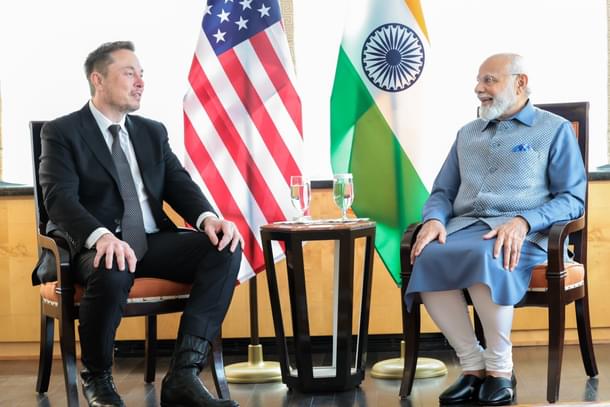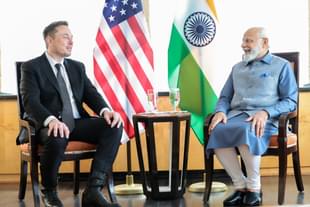Blogs
Who Controls the Skies, Controls the Nation: Why India Must Rethink Starlink Before It’s Too Late
Anshul Pandey
Jun 02, 2025, 02:25 PM | Updated 02:29 PM IST
Save & read from anywhere!
Bookmark stories for easy access on any device or the Swarajya app.


In an era defined by data, satellites, and algorithmic influence, India’s sovereignty is no longer only about controlling land and sea; it's about commanding the skies.
Today, a critical decision faces the Government of India: whether to approve Starlink, Elon Musk’s satellite-based internet service, for full-scale operations across Indian territory. It’s being framed as a progressive leap, a chance to bring fast internet to rural corners and close the digital divide.
But let’s pause. Strip away the PR gloss, and a sobering truth emerges: this is not just a technology deal. It’s a strategic pivot point that will decide who truly governs the digital highways of our nation.
The narrative surrounding Starlink is seductive. Who wouldn’t want blazing-fast connectivity in villages, Himalayan posts, or cyclone-prone coastlines?
The problem is not the technology itself. The issue is control.
Starlink satellites, once licensed, won’t just beam Netflix to remote towns—they could become the invisible backbone of public utilities, emergency response, education platforms, banking networks, and even military communications.
In such a future, what happens when India’s national interest diverges from the corporate interest of a private billionaire sitting 13,000 km away?
The answer isn’t theoretical. It’s already played out on the world stage.
Starlink in Ukraine: A Case Study in Control
During the Russia-Ukraine war, Starlink became the lifeline for Ukrainian military communications. But at a critical moment, Ukrainian forces found their drone attack plans blocked. Not by Russian cyberattacks. Not by NATO policy. But by a decision from Elon Musk himself, citing his concerns.
In that moment, global warfare was shaped not by sovereign nations but by the executive decision of a single private individual.
If a similar situation were to unfold in India—say, during a border standoff or internal emergency—can we afford such arbitrary external influence over vital infrastructure?
This is not fear-mongering. It’s strategic foresight.
India has spent decades investing in its own satellite programs through ISRO, building Aadhaar, launching the Unified Payments Interface (UPI), and now creating ONDC (Open Network for Digital Commerce) to prevent monopolies.
We didn’t build these from scratch only to hand over the next layer of infrastructure—space-based internet—to a foreign entity.
Digital sovereignty isn’t an abstract principle. It’s about ensuring that the communication backbone of a nation is accountable to its constitution, not shareholder meetings.
Who Really Owns India’s Borders?
If Starlink owns our satellite communications, it effectively owns our ability to police our borders, monitor our skies, and secure our economy. This isn’t just about faster internet; it's about national survival. We lose our sovereignty over all these vital areas.
Modern warfare is no longer about tanks and missiles alone. It’s about information, control, and uninterrupted connectivity. If satellite infrastructure is foreign-controlled, then so is India’s digital future.
Once licensed, Starlink will dominate the satellite broadband market with unmatched first-mover advantage. Millions will depend on it—from farmers to fintech. Even national security systems might begin to rely on its connectivity.
What happens then? India would lose the leverage to say "no" to Elon Musk—a man who has publicly acknowledged making geopolitical decisions based on personal instincts.
Our national security should not hinge on an app update or a Silicon Valley mood swing.
India's Ideological Contradiction
The ruling government has made self-reliance (Atmanirbhar Bharat) a cornerstone policy. It’s investing in Indian tech founders, championing homegrown platforms, and openly questioning digital monopolies.
So, here’s the contradiction:
How can we speak of Atmanirbhar Bharat and simultaneously open our skies to foreign-controlled infrastructure?
You can’t promote “Digital India” while bypassing Indian satellites. You can’t champion “Make in India” while renting space in someone else’s orbital empire. You can’t build “data embassies” and still let critical bytes be routed through external networks.
Policy must align with ideology. Otherwise, it's just optics.
Can India afford to put its critical infrastructure in the hands of a foreign company whose priorities are shaped by boardrooms in Silicon Valley?
Today it’s rural broadband. Tomorrow it could be strategic leverage.
The Argument for Regulation
Let’s be clear: This is not a call to ban Starlink. This is a call to regulate before we integrate.
India must set non-negotiable conditions before allowing satellite internet networks to operate:
- Data localization requirements
- Redundancy protocols using Indian systems
- Legal jurisdiction rooted in Indian law
- Emergency override rights retained by Indian authorities
- Reciprocity agreements with hosting nations
- Mandatory collaboration with ISRO and DRDO on all critical applications
And most importantly, limited dependence.
A single company, however innovative, must never be the sole artery for a nation's digital bloodstream.
Conclusion: The Choice Before Us
This is not about resisting change. It’s about designing change with foresight.
Every empire that fell, fell not because of enemies at the gate but because they gave up their command over internal systems.
India must not fall for the convenience trap. A few Mbps of speed are not worth megabytes of sovereignty lost.
This is the 21st-century battlefield: orbital lanes, digital pipes, data gateways. And the most important question we must ask is:
Will India remain the master of its own sky, or become a tenant in someone else’s constellation?
Let us choose wisely. Let us choose sovereignty.
Anshul Pandey is a Mumbai-based writer deeply rooted in Sanatan Dharma, with a strong grounding in Vedic literature and spiritual traditions. His work reflects a commitment to scriptural authenticity and dharmic values.





